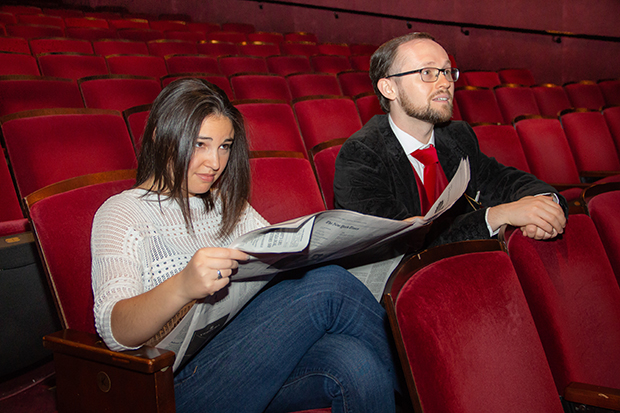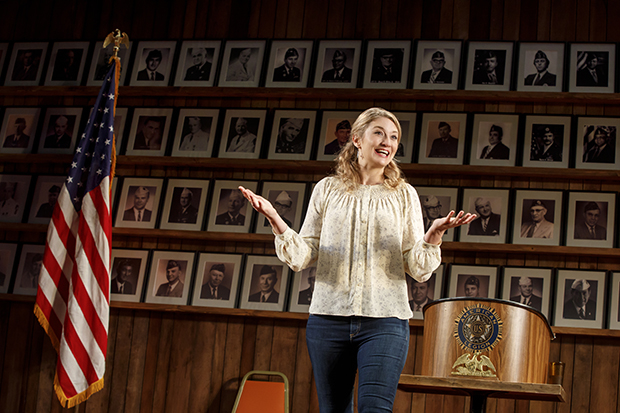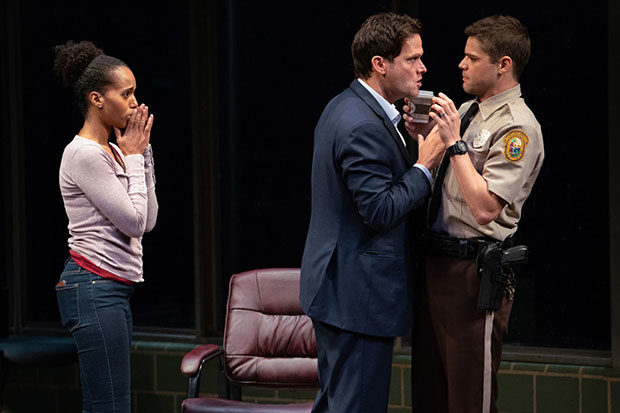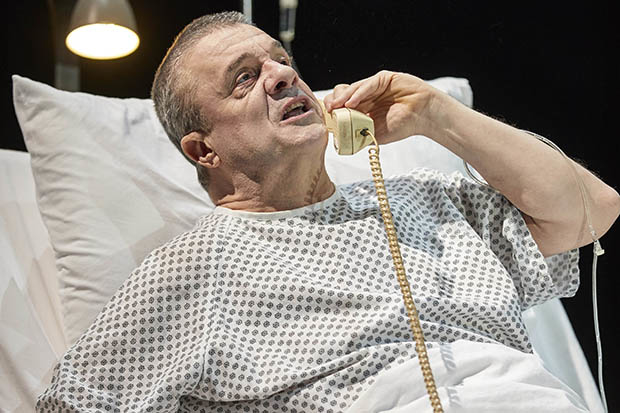Point-Counterpoint: Should Playwrights Grab Their Themes From the Headlines?
Our critics debate the benefits and pitfalls of “relevant” drama.
We devour the 24-hour news cycle on cable and on our social-media feeds, but should we also be thinking about the news while we're at the theater? Few serious theater lovers would argue that the stage should be exclusively reserved for escapism, but some take issue with so-called issue plays, seeing them as artless soap boxes for playwrights to spout their political views. Others relish the opportunity to digest the day's news through drama, forgiving contrivance if it can make them see things from a fresh perspective. Critics Hayley Levitt and Zachary Stewart debate the merits and faults of ripped-from-the-headlines theater in our latest Point-Counterpoint:

(© Seth Walters)
Hayley Levitt: Zach, after six years of working together, I'm well-versed in your love for talking politics, especially when political themes find their way into the theater — which is all the time in 2019. I think the theater community is feeling a responsibility to respond in real time to all of our national crises. And I hate to say it, but so often, the result is bad theater. My question for you, as our resident political correspondent, is should today's theater actually be ripped from today's headlines?
Zachary Stewart: Not everything produced in the theater needs to be topical, but it's thrilling when it is. The most electric feeling I've had in the theater recently was at Heidi Schreck's What the Constitution Means to Me. I saw it the evening of the Brett Kavanaugh confirmation hearing, and Schreck acknowledged that in the show, tying it into her personal story about how the Constitution has habitually failed women in its promise of equal protection. The whole theater was positively buzzing. I realize that What the Constitution Means to Me is a special kind of show in which the playwright is also the primary performer (so she can freely amend the script every night), but I still wish that more shows could so directly engage with the ever-changing world outside of the theater.

(© Joan Marcus)
Hayley: Heidi Schreck is in a rare position. Throwing in a current event makes everyone feel more present, which will always work in her favor. Traditional plays, on the other hand, are meant to feel more permanent, and I don't think we're ready to be drawing the broad conclusions that set-in-stone writing demands when we're still wading through the muck. It's like painting a landscape at the base of a mountain. Take something like Robert Schenkkan's Building the Wall. It ran off-Broadway a few months after the 2016 election, and it depicts Trump's dystopian America two years in the future (which I guess is right now). Schenkkan won a Tony for his LBJ play All the Way and a Pulitzer for The Kentucky Cycle. He's undoubtedly a talented writer. But Building the Wall just rang so false, and I think it's because it was an emotional regurgitation, not a fully metabolized idea.
Zach: In my review, I compared Building the Wall unfavorably to the Sinclair Lewis novel-turned-play It Can't Happen Here, which was about a hypothetical fascist takeover of the United States. Lewis wrote the play in 1936, when fascism was taking hold in large swaths of Europe. In response, the Federal Theatre Project mounted productions all over the country. The script still holds up as an excellent (and remarkably prescient) drama. It's not true of everyone, but some playwrights are able to approach current events with a probing perspective.
Hayley: Do you think the fact that It Can't Happen Here was looking ahead to a future abyss (World War II was still a few years off) rather than reacting to a recent catastrophe helped its case? Predicting where we're headed seems to have less of a "duh" factor and is potentially a productive exercise. Reflecting on yesterday's catastrophe is like listening to your mother vent about Donald Trump. That's essentially how I felt seeing American Son on Broadway. It comes across as an objectively tragic and horrifying story pulled from the evening news. But the fact that I know exactly where it's going and feel like it's offering no broader perspective than a Facebook debate makes it lose all the punch it's going for.

(© Peter Cunningham)
Zach: I actually really liked American Son. Christopher Demos-Brown nakedly wrote it to address the issue of police violence against young black men, but I was willing to forgive his contrivance because of the way the audience emotionally invested in the story. We never see Jamal, the young man who didn't return home (so his mother went looking for him at the police station), but judging by the reaction in the house, plenty of viewers (even white viewers) thought of him as their son by the end of the play. That's a pretty big achievement in empathy.
Hayley: Does it inspire real empathy or is the play one big leading argument? We could — and have argued about American Son specifically, but I think it highlights a problem a lot of these über-current plays run into. Plays about today's issues can get caught in today's political crossfire. Obviously that doesn't mean we shouldn't write about them. But that's how we end up with pieces like The Crucible, which allowed Arthur Miller to attack McCarthyism through the lens of the Salem witch trials; or Mother Courage, Brecht's response to fascism via the Thirty Years' War. Plays need distance from their subject to say what they want to say.
Zach: Arthur Miller wrote about how, at the 1953 debut of The Crucible, longtime friends shunned him in the lobby out of fear of being associated with a Communist sympathizer. They perfectly understood that he was writing about McCarthy, so the events onstage didn't feel distant at all. I agree that The Crucible is a great play because it identifies a chronic illness in American society (our witch hunters no longer hang the condemned, but they do "drag" and "burn" them on Twitter). But that's just one way to approach current events in the theater.
As Saturday Night Live shows each week, sketch comedy has the power of rapid response. We may look down our noses at it from the "legitimate" theater, but such snobbery lacks historical perspective: The cabarets of Weimar Germany featured sketches that were highly political. This "low" form hugely influenced "serious" 20th-century dramatists like Bertolt Brecht and Samuel Beckett. There's fluidity within the artificial taxonomy of theater, so why shouldn't there be similar exchange between the stage and the front page?

(© Brinkhoff-Moegenburg)
Hayley: That kind of exchange is possible, but the shelf life isn't very long. Rapid response performances might make a big splash but they burn out like a supernova. Playwrights typically want their work to have a more lasting impact than that.
Zach: But you can have both: When Tony Kushner's Angels in America debuted in 1991, the AIDS crisis was reaching a crest and the play was set just a few years in the past. Featuring real people and events, it was absolutely "ripped from the headlines." And yet, almost three decades later, we consider it one of our finest American plays. Based on the excellent Broadway revival last season, I don't expect that reputation to dissipate anytime soon. The news items that shake our souls tend to be connected to a perennial drama. Smart playwrights see that, and know how to put it onstage.









